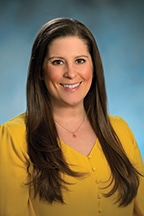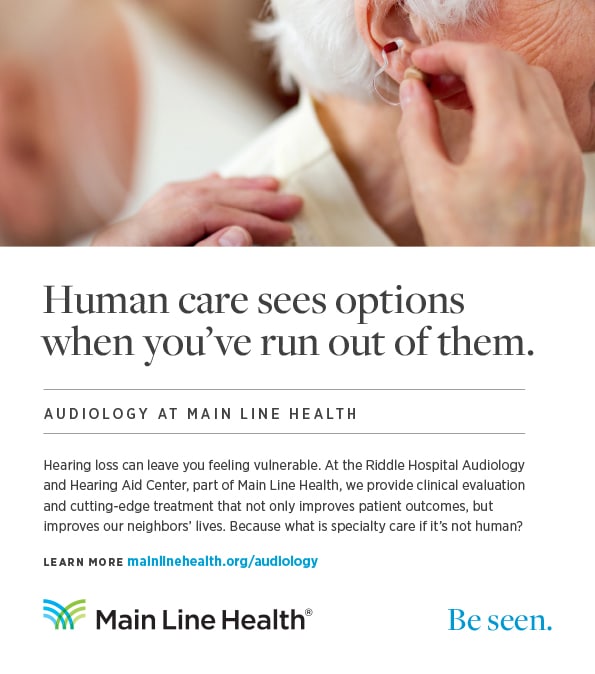Hearing & Your Health

By Jessica M. Bell, Au.D.
Director, Riddle Audiology
Prevention and wellness are vital factors in today’s outlook on healthcare. A variety of well-known health conditions show a strong connection to hearing loss. Treatment options for hearing loss, such as hearing aids, have shown to benefit overall health. Conditions that have shown to have a link to hearing loss include (but are not limited to):
Diabetes
The National Institutes of Health News showed in a 2008 study that hearing loss is two times more common in adults with Type 2 diabetes compared to those without diabetes. The nerves and blood vessels of the inner ear can become damaged due to pathological changes that are commonly seen in diabetes patients, resulting in hearing loss.
Cardiovascular
Poor cardiovascular health can cause decreased blood flow to the inner ear which, ultimately, can result in hearing loss particularly in the low frequency range. Therefore, if a hearing loss is determined in the low frequency range (think, the bass on a piano), this could be an early predictor for a potential cardiovascular event.
Falls
Falls, particularly in the elderly, can be attributed to a variety of factors – one, less commonly discussed, is untreated hearing loss. A study completed by US News found that people with a mild, 25 decibel hearing loss, are 3 times more likely to sustain a fall and for every additional 10 decibels of hearing loss, the risk increased by 1.4 times for falling. Dr. Frank Lin indicates that “people who can’t hear well might not have good awareness of their overall environment, increasing the potential to trip and fall.”
Cognitive Decline
Many research studies have shown that hearing loss may be linked to the onset of dementia or Alzheimer’s disease. People who have untreated hearing loss increase the amount of effort needed to understand speech which contends with normal cognition and could result in withdraw from social situations. By withdrawing from social situations, the brain is no longer exposed to typical daily communication which can decrease the amount of grey matter in the brain.
Cancer Treatments
Some chemotherapy and radiation treatments can cause ototoxicity which means the drugs can cause chemical damage to the inner ear or tiny hair cells in the cochlea. The damage can be temporary or permanent depending on the type of medication used. Additionally, ototoxic medications can also cause tinnitus (ringing in the ears) with or without the presence of hearing loss.
Depression
Depression has been linked to untreated hearing loss for a variety of reasons. One example is social isolation. When a person’s ability to communicate effectively decreases with hearing loss, the likelihood of withdrawing from social interaction increases. By slowly withdrawing from social events a person once loved to participate in, the more isolated they become. Eliminating social activities is a red flag for depression. The National Council on Aging found that 36% of patients who begin to wear hearing aids experienced improved overall mental health while 34% increased social engagement.
Understanding the link between hearing loss and other medical conditions is important to a person’s overall health. It is important for patients to have open communication with their physicians if they suspect hearing loss so that appropriate recommendations and referrals can be made to an audiologist for testing and treatment options.
The Riddle Experience
The audiologists at Riddle Hospital share the same goals that you do – to improve hearing health as well as increase your ability to understand and participate in your most difficult listening environments. A comprehensive audiological evaluation followed by a listening needs assessment and live hearing aid demonstration will allow the audiologist to make the best recommendations for a hearing treatment plan tailored to your listening needs.
For more information visit our website www.mainlinehealth.org/riddleaudiology
or call 484-227-3200
Jessica M. Bell, Au.D. Director/Doctor of Audiology
Alexa R. Lynch, Au.D Doctor of Audiology
Lisa C. Mackenzie, M.S. Clinical Audiologist
Julia Rainsford, Au.D. Doctor of Audiology
RIDDLE HOSPITAL
Audiology & Hearing Aid Center
1118 West Baltimore Pike Suite 207
Media, PA 19063
(484) 227-3200
mainlinehealth.org/RiddleAudiology


